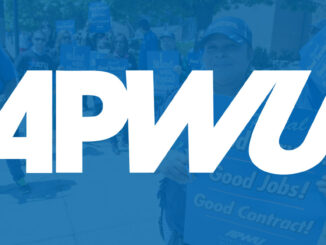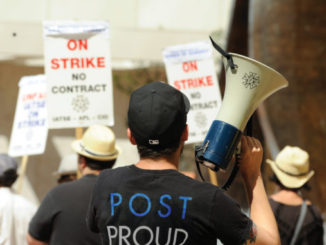
by Jeff Burman
I beg you to vote.
This is not an ordinary election. These are not ordinary times. As trade unionists, it is essential that the presidential candidate we back has pledged to support and even enhance what we do as union members. As former Editors Guild president Donn Cambern was fond of saying, we’re here to build a community. We organize ourselves collectively and have our union hammer out agreements with our employers. We use the combined strength of our numbers to get better and better deals: Ideally, better pay, better benefits, more jobsites organized.
More and more, as the earliest unionists said.
To be effective on labor issues, a candidate needs to pledge to make it easier for workers to form unions, to stand up to companies that ignore or violate labor law and to begin rolling back existing laws that do harm to the labor movement.
We trade unionists have such a candidate. We also have an incumbent president who actively works against our interests.
Defeating Trump is a ‘Matter of Life and Death’
In 2020, writes Harold Meyerson in Dissent magazine, “America’s labor movement [is] both emboldened and endangered as seldom before. For unions, removing Trump from the White House and replacing him with a Democrat is a matter of life and death.”
Trump’s massive 2017 capital gains tax cut included incentives for outsourcing. AFL-CIO president Richard Trumka said that 93,000 jobs were lost to outsourcing in the first year after the tax cut.
As if Trump’s bonfire of sociopathic civil insanity isn’t bad enough — defending racists in Charlottesville, putting immigrant children in cages, declaring members of the press to be enemies of the people, and his indifference to the human effects of the coronavirus and its devastating impact on the national economy — he has reversed advances in labor rules that were carefully put in place by his predecessor.
President Trump has reversed multiple labor gains that President Obama put in place.
He changed the personnel of the NLRB to make it more pro-business. He reduced the size and scope of the Occupational Safety and Health Administration’s field inspections, making them fewer and further between.
Trump is No Friend of Labor
Going to work has never been more dangerous. His indifference to COVID-19 precautions, his promotion of a discredited anti-malaria drug as a COVID-19 cure, and his interest in injecting household disinfectants are widely known.
Worse still, Trump has done great harm to the interests of union members through his judicial nominations. At last count, 203 new federal judges have been confirmed, including two new conservative Supreme Court justices. The broader, lasting effect on the courts is, of course, incalculable.
In February 2019, Senator Rand Paul called for a national “Right-to-Work” anti-union law. The law would prohibit “union security agreements,” which would prevent unions from requiring that members pay for their services, essentially reducing the unions to pauperdom and irrelevance. Our President and heckler-in-chief promised to sign the bill into law if it got to his desk. Thankfully, it hasn’t.
Former Vice President Joe Biden understands that unions help working people improve their lives with increases to wages and benefits. Biden doesn’t mince words: “There’s a war on organizing, collective bargaining, unions, and workers. It’s been raging for decades, and it’s getting worse with Donald Trump in the White House.”
Over the last several decades, the decline in private sector union membership has mirrored the decline of the middle class. Former Labor Secretary Robert Reich says that “strong unions mean a strong middle class which means a strong economy.”
Biden Understands Unions
According to Biden’s campaign website, the Democratic Party candidate would do several essential things.
He would make it easier to form and join unions. He would go after individual corporate CEOs who violate labor law. And he would go further than any other candidate before him by banning “Right to Work” laws.
“Unions have adopted a more expansive agenda than they’ve had in decades,” writes Meyerson. “They successfully persuaded mainstream Democrats to support much of it.” Candidate Biden “now feels compelled to consider policies that go beyond anything he’s supported before in order to rebuild an economy now in tatters. Labor and its allies are working to present him with a 21st century version of the New Deal.”
Biden understands the importance of facilitating union organizing. Many employers are able to “run out the clock” on negotiating an initial collective bargaining agreement. Biden promises to ban companies’ mandatory meetings with employees, including captive audience meetings in which the employees are forced to listen to anti-union threats.
As president, Biden would go even further by promoting the idea that unions should be a common feature in American workplaces. Today, union members make up just over 10 percent of the American workforce. That’s down from 35 percent in the 1950s. It is no coincidence that this decline has occurred at the same time as rising income inequality. According to Biden’s campaign website, when workers are thwarted from organizing and engaging in collective bargaining, stagnant wages and a declining middle class are the predictable result.
He promises to create a cabinet-level working group that would include representatives from labor. In the first 100 days of the administration, the group would present a plan to increase union density and reduce economic inequality. The group would advocate for allowing cities and states to pursue new ways to increase union organizing and collective bargaining without undermining current workers protections, like allowing for neutrality agreements and card check.
The group would also be tasked to work with unions and trade associations to plan the expansion of sectoral bargaining, where all competitors in an industry are engaged in collective bargaining with a single or multiple unions.
According to his campaign website, Biden pledges to “aggressively pursue employers who violate labor laws, participate in wage theft, or cheat on their taxes by intentionally misclassifying employees as independent contractors.”
He would pursue a legislative remedy to make organizing easier and make negotiating first contracts faster. Biden supports secondary boycotts and has long supported banning “permanent replacement” of strikers. Further, he pledges to “ensure federal dollars do not flow to employers who engage in union-busting activities, participate in wage theft, or violate labor law.”
Biden also promises to create over 10 million new jobs in “research and innovation to unlock and deploy new zero-carbon technologies for the future, create stable well-paying jobs across the US, and make zero-carbon technologies the most cost-effective and scalable way to meet our country’s energy needs.” Many of these jobs will be union jobs.
Biden would reinstate the National Labor Relations Board rule that would require joint-employer businesses, like fast food franchises, to collectively bargain together. Trump’s NLRB eliminated such rules that grew out of the landmark Browning-Ferris Industries court ruling. Biden would return the NLRB to its original purpose, “to encourage union organizing, support collective bargaining, and protect workers’ rights.”
There’s no other way to say this: Vote like a unionist on November 3.
Make sure you’re registered to vote. Go to vote.org.
Jeff Burman is a retired Guild member and former member of the MPEG Board of Directors.
This column represents the personal view of the author and does not necessarily represent the views of Motion Picture Editors Guild, its officers or staff members.





